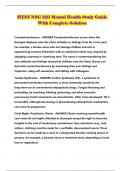Nsg 221 hesi Study guides, Class notes & Summaries
Looking for the best study guides, study notes and summaries about Nsg 221 hesi? On this page you'll find 12 study documents about Nsg 221 hesi.
All 12 results
Sort by
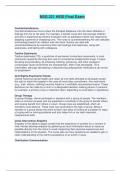
-
NSG 221 HESI Final Exam - Questions and Answers
- Exam (elaborations) • 16 pages • 2024
- Available in package deal
-
- $18.49
- 1x sold
- + learn more
NSG 221 HESI Final Exam - Questions and Answers Countertransference Countertransference occurs when the therapist displaces onto the client attitudes or feelings from his or her past. For example, a female nurse who has teenage children and who is experiencing extreme frustration with an adolescent client may respond by adopting a parental or chastising tone. The nurse is countertransfering her own attitudes and feelings toward her children onto the client. Nurses can deal with countertransfer...

-
NSG221/ NSG 221 HESI: (Latest 2024/ 2025 Update) Mental Health Review| Questions and Verified Answers| 100% Correct| Grade A – Herzing
- Exam (elaborations) • 26 pages • 2024
- Available in package deal
-
- $10.99
- + learn more
NSG221/ NSG 221 HESI: (Latest 2024/ 2025 Update) Mental Health Review| Questions and Verified Answers| 100% Correct| Grade A – Herzing Q: Codependent Behaviors & Alcohol Abuse Answer: Codependence is a maladaptive coping pattern on the part of family members or others resulting from a prolonged relationship with the person who uses substances. Characteristics of codependence are poor relationship skills, excessive anxiety and worry, compulsive behaviors, and resistance to change. Fami...
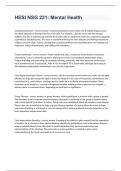 Popular
Popular
-
HESI NSG 221: Mental Health exam 2023 with 100% correct answers
- Exam (elaborations) • 17 pages • 2023
- Available in package deal
-
- $17.49
- 2x sold
- + learn more
Countertransference - correct answer -Countertransference occurs when the therapist displaces onto the client attitudes or feelings from his or her past. For example, a female nurse who has teenage children and who is experiencing extreme frustration with an adolescent client may respond by adopting a parental or chastising tone. The nurse is countertransfering her own attitudes and feelings toward her children onto the client. Nurses can deal with countertransference by examining their own feel...
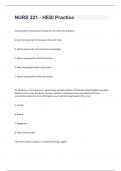
-
NSG 221 Herzing University -NURS 221 - HESI Practice well answered to pass rated A+
- Exam (elaborations) • 44 pages • 2024
- Available in package deal
-
- $19.99
- + learn more
NURS 221 - HESI PracticeAt what step in the procedure should the nurse don sterile gloves? A. prior to removing the dressing on the client's hip B. before opening the new sterile dressing package C. before cleansing the client's hip incision D. after cleansing the client's hip incision C. before cleansing the client's hip incision On admission, a client presents a signed living will that includes a Do Not Resuscitate (DNR) prescription. When the client stops breathing, th...
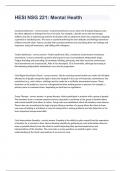
-
HESI NSG 221: Mental Health exam 2023 with 100% correct answers
- Exam (elaborations) • 17 pages • 2023 Popular
- Available in package deal
-
- $16.49
- 1x sold
- + learn more
Countertransference - correct answer -Countertransference occurs when the therapist displaces onto the client attitudes or feelings from his or her past. For example, a female nurse who has teenage children and who is experiencing extreme frustration with an adolescent client may respond by adopting a parental or chastising tone. The nurse is countertransfering her own attitudes and feelings toward her children onto the client. Nurses can deal with countertransference by examining their own feel...
HESI NSG 221 Mental Health Study Guide With Complete Solution...
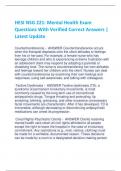
-
HESI NSG 221: Mental Health Exam Questions With Verified Correct Answers | Latest Update
- Exam (elaborations) • 24 pages • 2023
-
- $15.99
- + learn more
HESI NSG 221: Mental Health Exam Questions With Verified Correct Answers | Latest Update Countertransference - ANSWER Countertransference occurs when the therapist displaces onto the client attitudes or feelings from his or her past. For example, a female nurse who has teenage children and who is experiencing extreme frustration with an adolescent client may respond by adopting a parental or chastising tone. The nurse is countertransfering her own attitudes and feelings toward he...
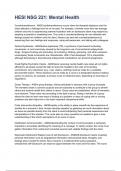
-
HESI NSG 221: Mental Health 2024/2025 already graded A+
- Exam (elaborations) • 15 pages • 2024
- Available in package deal
-
- $7.99
- + learn more
HESI NSG 221: Mental Health 2024/2025 already graded A+
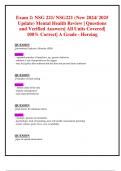
-
Exam 2: NSG 221/ NSG221 (New 2024/ 2025 Update) Mental Health Review | Questions and Verified Answers| All Units Covered| 100% Correct| A Grade - Herzing
- Exam (elaborations) • 13 pages • 2024
- Available in package deal
-
- $10.49
- + learn more
QUESION Intermittent Explosive Disorder (IED) - repeated episodes of impulsive, ag- gressive behavior - outburst is out of proportion to the trigger - may feel guilty after outbursts but this does not prevent future outbursts QUESION Principles of limit setting Answer: - inform client of the rule - explain consequences - state expected behavior QUESION Risk factors for substance abuse Answer: - biologic: parents are alcoholics - psychologic: lack of nurturin...

-
NSG222 Study Guide Exams With All Correct Answers Latest Bundle 2024Updated 2025.
- Package deal • 3 items • 2024
-
- $22.99
- + learn more
1 Exam (elaborations) HESI NSG 221 Mental Health Practice Exam Questions With All Correct Answers 20242025 Updated. 2 Exam (elaborations) NSG 222 Family Nursing Study Guide Exam And Actual Answers Updated 20242025. 3 Exam (elaborations) NSG222 Family Nursing Practice Exam Fully Solved Latest 2024/Updated 2025. 4 Exam (elaborations) OB - EXAM 3 S

How much did you already spend on Stuvia? Imagine there are plenty more of you out there paying for study notes, but this time YOU are the seller. Ka-ching! Discover all about earning on Stuvia



